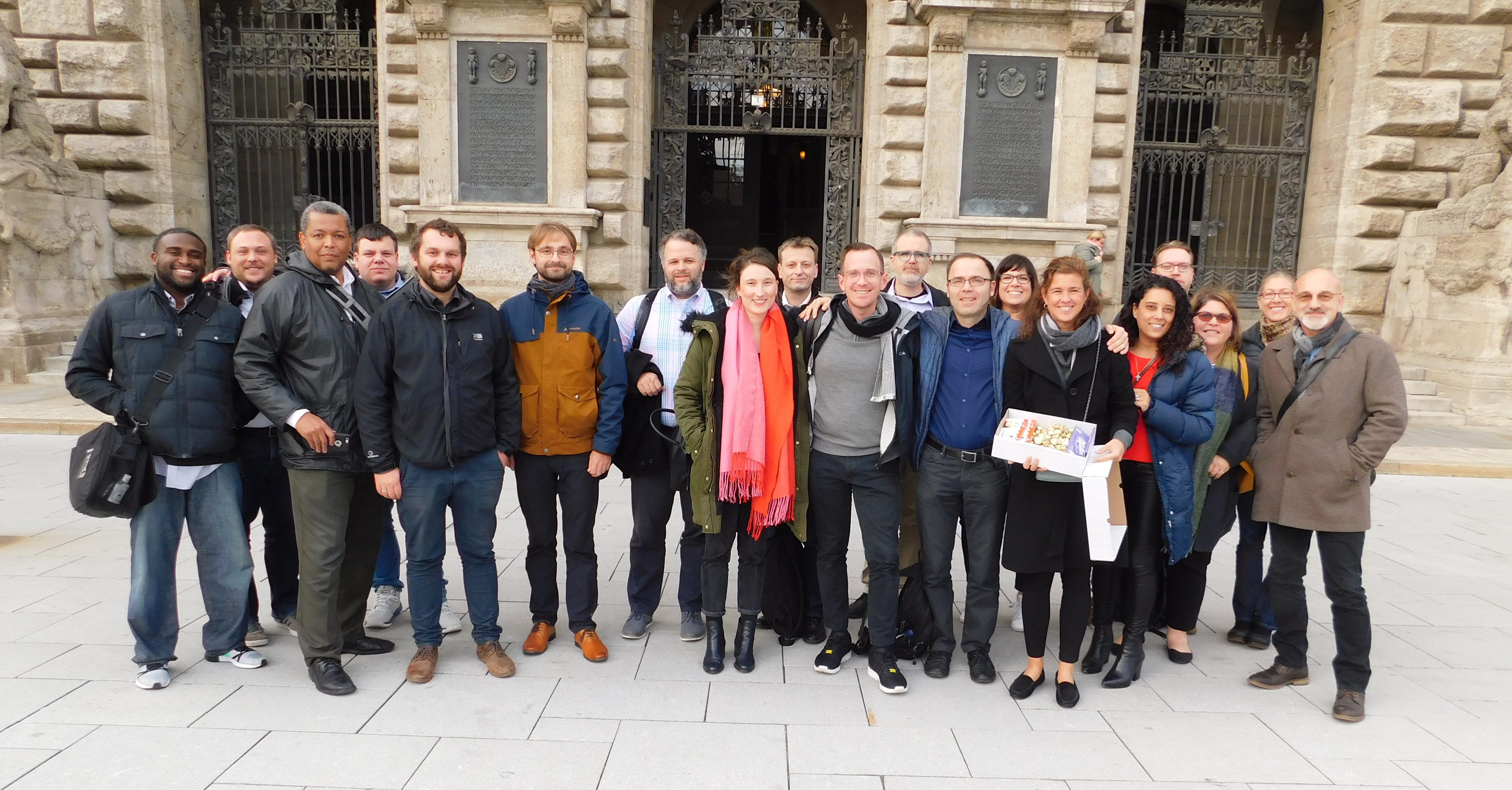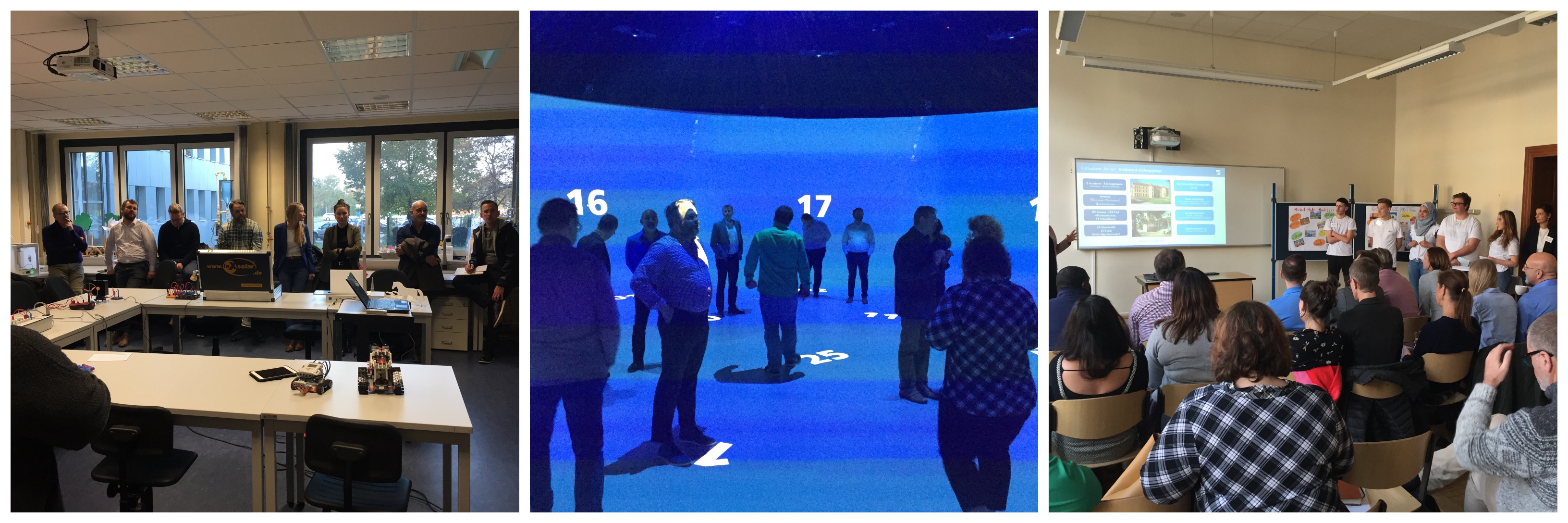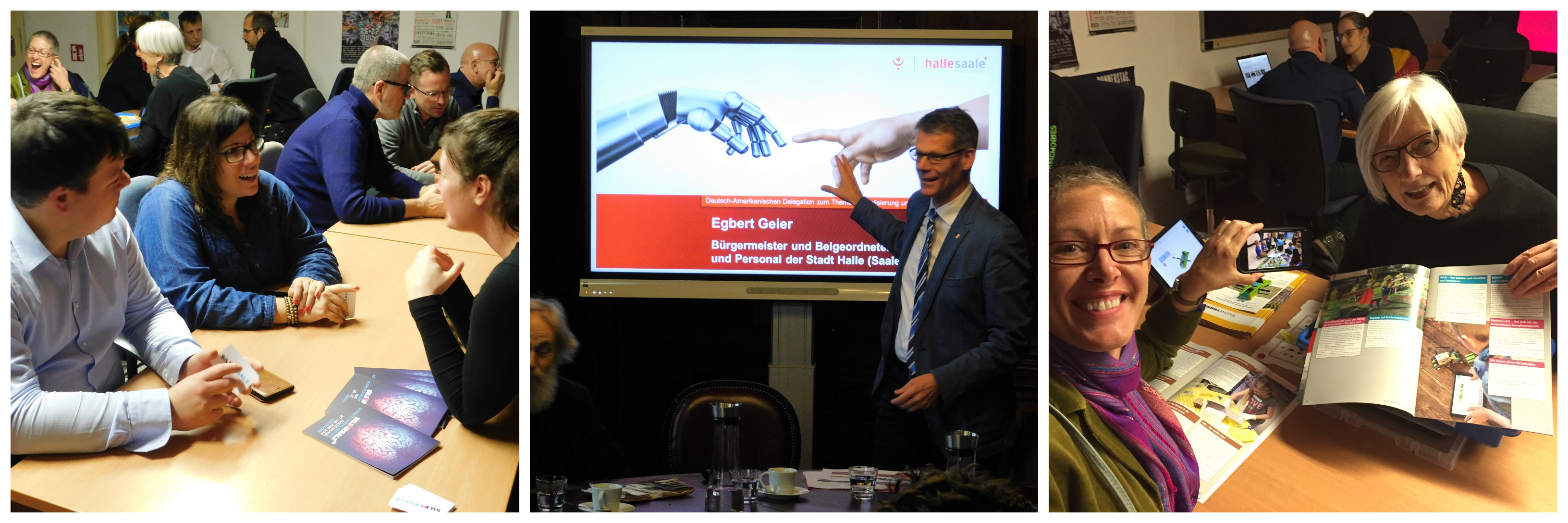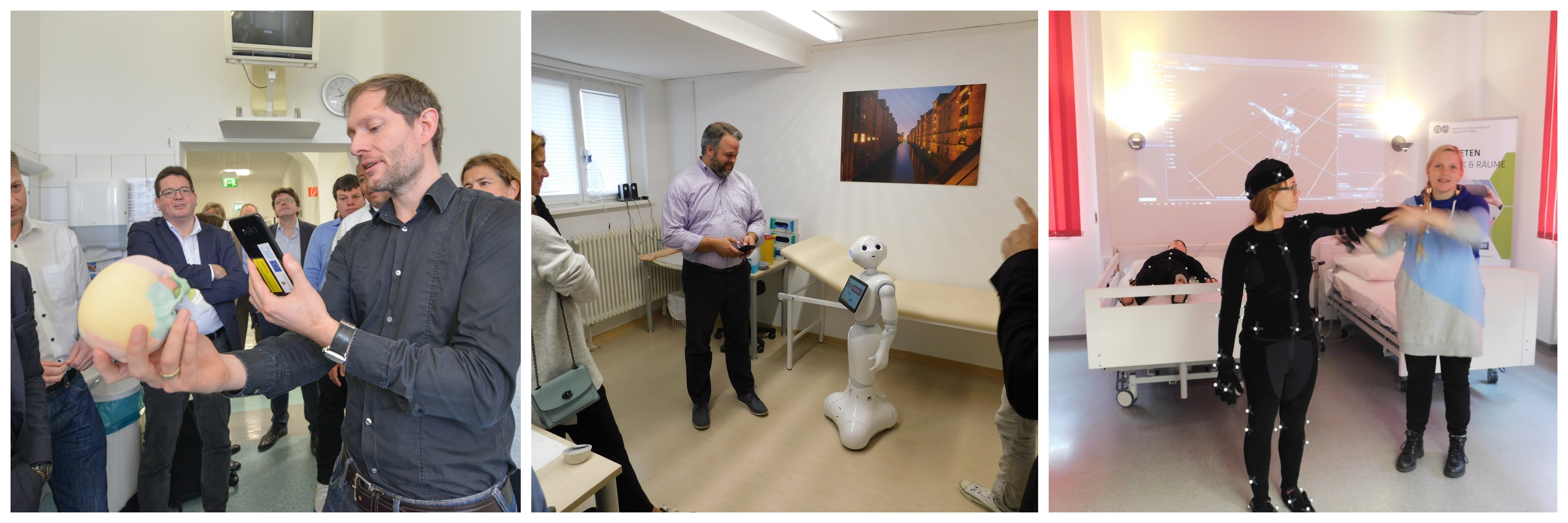 From November 10 to November 16, a 21-person delegation of Germans and Americans visited Magdeburg, Halle, and Leipzig as part of the second round of exchanges of the ACG’s Transatlantic Cities of Tomorrow: Digitalization and the Future of Work initiative. The cohort of education and workforce development specialists, information technology experts, and representatives from economic development organizations, chambers of commerce, incubators, and city government had the opportunity to expand on their experiences from their U.S. trip in September.
From November 10 to November 16, a 21-person delegation of Germans and Americans visited Magdeburg, Halle, and Leipzig as part of the second round of exchanges of the ACG’s Transatlantic Cities of Tomorrow: Digitalization and the Future of Work initiative. The cohort of education and workforce development specialists, information technology experts, and representatives from economic development organizations, chambers of commerce, incubators, and city government had the opportunity to expand on their experiences from their U.S. trip in September.
The group of 11 Americans from Charlotte, Knoxville, and Nashville, and 10 Germans from Magdeburg, Halle, and Leipzig began their program in Magdeburg. A visit to the Vocational School Hermann Beims, together with a representative from the IHK Magdeburg / Chamber of Industry and Commerce, provided an overview and insights about the German dual system of apprenticeship training. At the Virtual Development and Training Center of the Fraunhofer IFF, the delegation stepped into the Elbedome to experience how state-of-the-art VR technologies are being used for digital training and optimization of processes in manufacturing. Further meetings with representatives from the Federal Labor Office, Fachkraft im Fokus, the Mittelstand 4.0 Kompetenzzentrum Magdeburg, and the Institute for Vocational and Company Education of the University of Magdeburg explained efforts to prepare workers for existing jobs, to help companies transition to Industry 4.0 manufacturing processes, and to train teachers to better teach technology to young students. Meetings with Otto-von-Guericke University Magdeburg, the University of Applied Sciences Magdeburg-Stendal, Project EMI, and Gründerstadt Magdeburg explained how entrepreneurship and innovation are taught and promoted in the city.

In Halle, the delegation first visited SaltLabs, a newly established co-working space meant to support start-ups in the city. During a speed-dating session at the makerspace Eigenbaukombinat, the group had the opportunity to meet with a variety of local organizations that are part of the OpenLabNet Halle network to learn about how digitalization is impacting their work. At a meeting hosted by the city administration of Halle, Mayor Egbert Geier and representatives from Metropolregion Mitteldeutschland, the Regionales Digitalisierungszentrum Sachsen-Anhalt Süd, and Merseburger Innovations- und Technologiezentrum shared how the region is adapting to digitalization.
 Dr. Christian Tietje, the Rector of the Martin-Luther-University Halle-Wittenberg (MLU), welcomed the delegation to the university’s SkillsLab and Simulation Center where cutting edge technologies utilizing smart devices, robots, and virtual reality are being used to not only train medical students, but also to examine how health care services can be digitally implemented. Representatives from the university’s Teaching@digital Initiative and Center for Multimedia Teaching and Learning explained how teachers and faculty are being prepared to integrate digital tools and methods into their lesson plans and interaction with students. Visits to the MMZ Mitteldeutsches Multimediazentrum Halle (Saale), Technologiepark Weinberg Campus / Univations, and Fraunhofer Institute for Microstructure of Materials and Systems IMWS shared insights on entrepreneurship, innovation management and knowledge and technology transfer in Halle.
Dr. Christian Tietje, the Rector of the Martin-Luther-University Halle-Wittenberg (MLU), welcomed the delegation to the university’s SkillsLab and Simulation Center where cutting edge technologies utilizing smart devices, robots, and virtual reality are being used to not only train medical students, but also to examine how health care services can be digitally implemented. Representatives from the university’s Teaching@digital Initiative and Center for Multimedia Teaching and Learning explained how teachers and faculty are being prepared to integrate digital tools and methods into their lesson plans and interaction with students. Visits to the MMZ Mitteldeutsches Multimediazentrum Halle (Saale), Technologiepark Weinberg Campus / Univations, and Fraunhofer Institute for Microstructure of Materials and Systems IMWS shared insights on entrepreneurship, innovation management and knowledge and technology transfer in Halle.
 The Leipzig program began with a visit to SpinLab – The HHL Accelerator to learn about the digital start-up culture in the city and included presentations from Impact Hub and seecon on how each organization is utilizing digital technologies to promote sustainability. The delegation met with the Digital City Unit of the City of Leipzig to discuss digitalization and smart city initiatives that are meant to create efficiencies internally for the city as well as for stakeholders in the community. Visits to the Leipzig Municipal Transit Authority and the BMW Factory Leipzig provided insights to the strategies being used to promote e-mobility, as well as smart devices to enhance manufacturing processes and customer service. Additional meetings with the Leipzig Chamber of Industry and Commerce, the Leipzig University of Applied Sciences, and the nonprofit organizations dezentrale e.V., Kontaktstelle Wohnen, and WeCreate – Community Network Project rounded out the visit to Leipzig.
The Leipzig program began with a visit to SpinLab – The HHL Accelerator to learn about the digital start-up culture in the city and included presentations from Impact Hub and seecon on how each organization is utilizing digital technologies to promote sustainability. The delegation met with the Digital City Unit of the City of Leipzig to discuss digitalization and smart city initiatives that are meant to create efficiencies internally for the city as well as for stakeholders in the community. Visits to the Leipzig Municipal Transit Authority and the BMW Factory Leipzig provided insights to the strategies being used to promote e-mobility, as well as smart devices to enhance manufacturing processes and customer service. Additional meetings with the Leipzig Chamber of Industry and Commerce, the Leipzig University of Applied Sciences, and the nonprofit organizations dezentrale e.V., Kontaktstelle Wohnen, and WeCreate – Community Network Project rounded out the visit to Leipzig.
 Following the reciprocal exchange, the participants in each city are now in the process of identifying concrete ideas of projects that could be undertaken in their home communities, or in collaboration with their partner city, based on lessons learned during the program. These will then be developed into community action plans to continue the engagement of everyone and to help ensure that there is a tangible impact from the exchanges in the participating communities.
Following the reciprocal exchange, the participants in each city are now in the process of identifying concrete ideas of projects that could be undertaken in their home communities, or in collaboration with their partner city, based on lessons learned during the program. These will then be developed into community action plans to continue the engagement of everyone and to help ensure that there is a tangible impact from the exchanges in the participating communities.
The next round of reciprocal exchanges will take place in April and June 2020 and will include Denver, Boulder, and Colorado Springs in the United States, as well as Mainz, Heidelberg, and Stuttgart in Germany.
Transatlantic Cities of Tomorrow: Digitalization and the Future of Work is a three-year reciprocal exchange for thought-leaders in small- and medium-sized cities in Germany and the U.S. to develop solutions to common challenges resulting from digitalization and to identify innovative approaches to turning these challenges into opportunities for their local workforce and economies.
The project is organized and administered by the American Council on Germany with generous support from the Transatlantic Program of the Government of the Federal Republic of Germany through funds of the European Recovery Program (ERP) of the Federal Ministry of Economics and Energy (BMWi). This project is also administered under the auspices of the Deutschlandjahr USA 2018/19 – Year of German-American Friendship.


